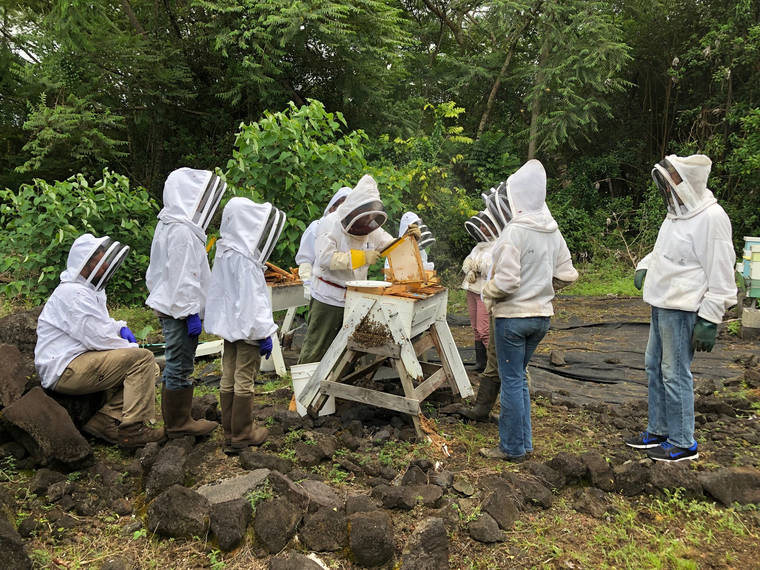Buzz for bee industry: Resolution calls for formation of working group
Big Island beekeepers are buzzing.
Hawaii County Council on Wednesday will consider a resolution to establish a working group to examine and address challenges in beekeeping on the Big Island by recommending updates to county ordinances.
ADVERTISING
The resolution, introduced by Puna Councilwoman Ashley Kierkiewicz, was unanimously recommended for approval by the council’s Agricultural, Water, Energy and Environmental Management Committee earlier this month.
Kierkiewicz said in an email that members of the Big Island Beekeepers Association had reached out about reviewing and updating county codes governing beekeeping to better reflect what’s happening on the ground.
“There are some zoning issues to resolve in terms of where beekeeping can take place and the desire to update the code to encourage best management practices,” she said. “I’m not a beekeeper, but I know people who are. I wanted to convene a conversation that was inclusive of county, community and industry so we could develop good, wholesome policy together.”
Currently, apiaries can only be kept in agricultural and intensive agricultural zoning districts and must be 1,000 feet from a “major road,” a term that is not defined in the county code.
Iris Carter, a member of the Big Island Beekeepers Association, said the matter came to the group’s attention after a member who lives in residential Hilo was forced to remove his beehives.
“When what they do is so important, it’s important the hives are allowed to thrive,” she said.
A backyard beekeeper herself, Carter said she likes having the bees there for pollination.
“I feel like I’m helping out the environment and ecology of the island by having bees that pollinate fruit trees and flowers,” she said. “I just like having them around. … They keep me alive. They keep my food chain going, so it behooves me to help them out and help them.”
According to Carter, queen bee breeders bring in $10 million a year to Hawaii’s economy, and 80 percent of crops grown here are pollinated by bees.
There are no feral hives left in Hawaii because of the introduction of varroa mites and small hive beetles that have decimated hives in the wild, she said.
Food produced in Hawaii is dependent on bees that come from a beekeeper’s hive, Carter said.
The working group will “study the present ordinance to see what can be done to protect beekeeping and nurture it on this island, to see if they can make it easier for people to (keep) bees,” she said.
Whether someone has four hives or 20,000, Carter said it’s important the laws reflect what the needs are in the beekeeping community.
“We’re small-time beekeepers, mostly, but the whole industry … is under threat because the laws can be used against them.”
According to the resolution, bee populations are declining rapidly around the world as a result of the loss of habitat, disease, parasites, pesticides and natural disasters. There was a 40 percent decline in managed beehives on the continental United States in 2018.
Nearly one in three bites of food rely on pollination from honey bees, according to information provided by the state Department of Agriculture’s Hawaii Apiary Program.
Macadamia nuts, avocado, coffee, citrus and lychee are among the crops that require pollination from honeybees to produce fruit.
Hawaii also produces 25 percent of queen bees shipped to the mainland and 75 percent of the queens shipped to Canada.
The working group would be co-chaired by Kierkiewicz and Kohala Councilman Tim Richards, and comprised of representatives from the county’s Planning Department and corporation counsel, state Department of Agriculture, state Department of Health, the University of Hawaii at Hilo, and up to six community members from around the island involved in a range of beekeeping endeavors.
The working group will dissolve one year from the passage of the resolution and will submit a report to the council next February with findings and recommendations.
Interested beekeepers can reach Big Island Beekeepers Association at bigislandbeekeepers@gmail.com.
Email Stephanie Salmons at ssalmons@hawaiitribune-herald.com





